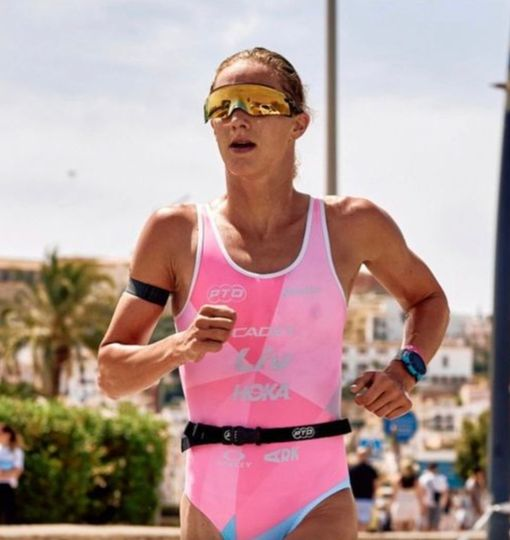It started like any other race. Sweat, adrenaline, and the grit that defines elite athletes. But one image—one unedited, raw photo—sparked a global conversation that reached far beyond the finish line. British triathlete Emma Pallant-Browne didn’t just run the race—she reshaped the narrative around female athletes, periods, and performance.

An Athlete Who’s No Stranger to the Spotlight
Emma Pallant-Browne is no rookie in the world of endurance sports. With medals from world-class events like the World Long Distance Triathlon Championships and Ironman 70.3, she’s known for her resilience, power, and grace under pressure. Her career is a blend of sweat, sacrifice, and strategy—just like every great athlete.
But it wasn’t a gold medal or personal record that made headlines this time. It was a single photo. A moment captured in time that revealed something rarely spoken about, let alone celebrated, in competitive sports: the visible mark of menstruation.
Video: How Periods Impact Athlete Performance
The Detail That Changed the Narrative
During the PTO Tour European Open in Ibiza—just days after Emma won the Duathlon World Championship—she was photographed mid-race wearing a pink and blue racing swimsuit. One sharp-eyed commenter noticed a red stain on the suit, the result of Emma competing during her period. Rather than showing support or empathy, the comment leaned toward critique: “Not the most flattering photo of Emma, surely they can crop it a little better.”
Sounds familiar? For many women, it’s a moment of déjà vu—the fear, the judgment, the discomfort around something completely natural.
Turning Criticism Into a Conversation
Most people might shrink from that kind of public comment. Not Emma. Instead, she leaned in.
She responded directly, explaining that even the most absorbent tampons don’t always last through a grueling athletic event. “It’s regular, and part of being a woman,” she wrote. And just like that, a moment that could’ve been buried in shame transformed into a message of empowerment.
A few days later, Emma reposted the now-viral photo on her own Instagram, fully embracing the moment and the discussion it sparked.
“This Is a Woman’s Sport”
Her post went deeper than just one picture. Emma shared how her choice of a lighter-colored suit was about managing her body temperature in intense heat—a critical factor since she’s prone to passing out during hot races. She explained the practical, performance-based decisions behind her gear. And she made it clear: what’s natural should never be hidden.
“If you have a photo like this, save it, cherish it, and remember how you performed on a tough day,” she wrote, echoing a sentiment that resonated with thousands. The message? Women shouldn’t have to hide their biology to be accepted, respected, or celebrated.
Breaking Down Barriers in Women’s Sports
Emma’s story hits home because it’s not just about one athlete. It’s about the silent, shared experiences of women in sports—and in everyday life—who deal with stigma, discomfort, and unrealistic expectations. Her candid message reminds us that real strength isn’t always clean or pretty. Sometimes, it’s messy. Sometimes, it bleeds. And sometimes, it changes the world.
Periods are still taboo in many spaces—even among professional athletes. But Emma didn’t just break the silence—she shattered it. She gave permission to every woman who’s ever felt embarrassed for something that’s as natural as breathing.
The Internet Responds: A Wave of Support
While the original comment tried to reduce her to a poorly timed photo, the response was anything but negative. Emma received an outpouring of support from both men and women around the world. Messages came flooding in—thanking her for her honesty, bravery, and for showing the unfiltered reality of being a female athlete.
Her courage created space for conversation. Not just in sports, but in schools, workplaces, and families. And that’s how change happens—not through silence, but through visibility.
A New Definition of Victory

Emma Pallant-Browne may have finished fourth in that race, but she walked away with a win that can’t be measured in medals. She turned what some might call an “embarrassing moment” into a teaching opportunity. She redefined what strength looks like in a female athlete. She reminded the world that periods aren’t shameful—they’re proof of life, resilience, and real womanhood.
Conclusion: More Than a Race, More Than a Photo
That single image of Emma running wasn’t about weakness. It was about showing up, pushing through, and owning her story—no edits, no filters. It’s a powerful reminder that women don’t need to hide who they are to succeed. The human body, in all its natural complexity, belongs in sports, in media, and in every conversation.
So next time someone wants to crop out the truth, remember Emma. Remember that one photo, one voice, can change everything. And if you ever feel uncomfortable being real—know that the most inspiring athletes are the ones who run through discomfort, not away from it.


